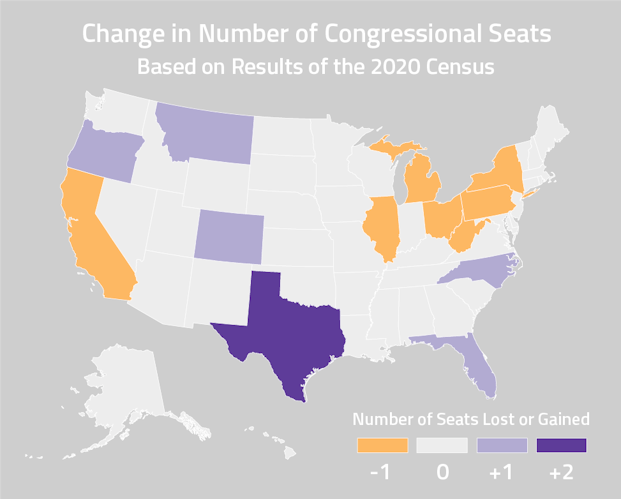Wisconsin’s number of seats in the U.S. House of Representatives will remain at eight, according to apportionment data published by the U.S. Census Bureau on Monday.
Due to the pandemic, the Census process was delayed. Redistricting data, which is used for redrawing congressional and legislative districts, was originally scheduled to be delivered by the beginning of April. That data is expected to be released by mid- to late-August.
Nationally, Republicans hold an advantage in the redistricting process, as they control more state governments and therefore have more control over how new congressional districts are drawn.
In Wisconsin, though, Republicans lack that advantage. After Gov. Tony Evers’ election in 2018, Republicans will no longer dominate the redistricting process as they did in 2011. However, Democrats are also unable to push through their own maps, as both Evers and the legislature must agree on a redistricting proposal for it to pass.
While Evers created an independent commission in January 2020 to propose maps to the legislature, partisanship will likely leave Wisconsin’s electoral maps to be drawn by federal courts, as they were in 1991 and 2001.
The Census Bureau also released updated state population counts on Monday. Wisconsin’s population is now listed as 5,893,718, which is a 3.6 percent increase from 5,686,986 in 2010. Despite ranking 34th nationally for population growth, Wisconsin remains the 20th-most populous state in the nation.
In comparison to its Midwestern neighbors, Wisconsin grew faster than Ohio (2.3%), Michigan (2.0%), and Illinois (-0.1%), but lagged behind Minnesota (7.6%), Indiana (4.7%) and Iowa (4.7%).
The national population growth was 7.4 percent, the lowest rate recorded since the Great Depression era. The South and West regions experienced the most population growth, while the Northeast and Midwest experienced the least.
Shifts in congressional representation were also lower than expected, with only 13 states seeing a change in seats. Among the winners, Texas gained two seats while five other states — Colorado, Florida, Montana, Oregon and North Carolina — each gained one seat.
The gains in those states came at the expense of California, Illinois, Michigan, New York, Ohio, Pennsylvania and West Virginia, which all lost one district each.

California lost a seat for the first time in state history, highlighting the state’s weakening population growth and emigration crisis.
New York was initially thought to be in danger of losing two seats, but came up only 89 people short from retaining all of its 2010 seats. The razor-thin margin not only displays the importance of completing the Census, but has also reignited controversies about former President Donald Trump’s unsuccessful attempt to exclude undocumented immigrants from the Census.
Arizona was expected to gain a seat, but remained unchanged. The opposite happened in Alabama, Minnesota and Rhode Island, with each state retaining a seat they were expected to lose.
Changes in congressional representation appear to be slightly beneficial for Republicans, with states won by Joe Biden in the 2020 election losing three seats and states won by Donald Trump gaining three seats. If the 2020 election was held with the new data, the electoral vote would be 303-235 in favor of Biden, a margin similar to his 306-232 victory in the presidential election.
Still, a small change in seats could have a large impact on the 2022 elections. Democrats in the House currently have a razor-thin three-seat majority, making the Republicans’ net gain of three seats in reapportionment more consequential.
Tyler Katzenberger is the former managing editor at The Daily Cardinal. He also served as the state news editor, covering numerous protests, elections, healthcare, business and in-depth stories. He previously interned with The Capital Times, Milwaukee Journal Sentinel and is an incoming POLITICO California intern. Follow him on Twitter at @TylerKatzen.






